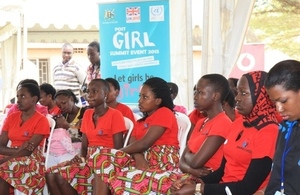Senior DFID official visits Uganda
Director General for Country Programmes meets Ugandan ministers and travels to Karamoja

Paticipants at the event to follow-up on the Girl Summit in Kampala
Joy Hutcheon, Director General for Country Programmes at the UK’s Department for International development (DFID), visited Uganda from 20 to 22 January. She saw at first hand DFID-funded projects in the Karamoja region of NE Uganda, and met a range of stakeholders in Kampala, including the Ugandan Ministers of Gender and Finance, the Prime Minister and the First Lady. A particular focus of Ms Hutcheon’s visit was to follow up on the Girl Summit, which the UK government hosted in London in July 2014, and examine issues facing girls and young women, including early marriage and Female Genital Mutilation (FGM).
During Ms Hutcheon’s visit, an editorial - which she co-authored with Ms Janet Museveni, the First Lady of Uganda and Minister for Karamoja Affairs, and Ms Mary Karooro Okurut, Minister of Gender, Labour and Social Development - was published in the Daily Monitor and New Vision newspapers. The text of the editorial is below:
Child Marriage and Female Genital Mutilation Must End in Our Generation
Child, early and forced marriage (CEFM) and female genital mutilation (FGM) may seem to some like outdated practices, but many girls are still experiencing the pain and trauma of both practices in Uganda and around the world.
In developing countries, one in four girls has been married by the age of 18. In Uganda, this remains of great concern with a high number of girls getting married before they reach the age of 18. More than 130 million girls and women are estimated to have experienced some form of FGM in Africa and the Middle East. The Karamoja region has a high prevalence of FGM. Each of these girls and women represents a personal story of physical scars, emotional pain, and for many, a life of missed opportunities.
Child marriage (under 18 years) is not only a violation of the rights of the child, but has harmful consequences that last a life time.Girls who are married before the age of 18 are less likely to complete primary school, are more at risk of sexual abuse and violence and are more likely to have unwanted pregnancies. Girls are more likely to have problems in pregnancy and they and their babies are more likely to die in childbirth. Some effects are harder to measure. Child marriage undermines personal development and limits future employment and other opportunities.
FGM also blights girls’ and womens’ lives, as they suffer for the rest of their lives from the physical, emotional and sexual effects: chronic pain, genital ulcers, greater risk of infection, increased risk of complications during child birth, and psychological consequences.
These problems go beyond girls and women, affecting families, communities, and Uganda’s development. Married girls that drop out of school and get pregnant young are less able to take up economic opportunities which have a negative impact on economic growth.
The Uganda and United Kingdom Governments are committed to advancing the rights of women and girls. We believe that investing in women and girls is critical for development – it requires strong, open and inclusive economies, societies and political institutions which harness the leadership, participation, skills and innovation of girls and women.
On 22 July 2014, the UK Government and UNICEF co-hosted the Girl Summit in London, to mobilise domestic and international efforts to end FGM and CEFM within a generation. All participating countries, organisations and agencies at the Girl Summit pledged to end child marriage and FGM in our generation.
Uganda was represented by Hon. Mary Karooro Okurut who signed the global Charter to end child marriage and FGM, and also pledged to:
- Prioritise attention to pursue abandonment of FGM and CEFM in the National Development Plan, the Development Plan for the Social Development Sector and District Development Plans.
- Formulate a Sector Strategy to address FGM and CEFM.
- Mobilise domestic resources to address FGM and CEFM.
- Improve the effectiveness of District Probation and Child Welfare Departments.
- Undertake a national campaign to sensitise communities through the media.
- Work with communities to address social norms that perpetuate FGM and CEFM.
- Provide a conducive environment for civil society advocacy on FGM and child marriage.
At the Summit, the UK announced a commitment of UGX 110 billion for a new UN Multi-Country programme in 12 countries to end child marriage. This will include new funding for Uganda which will be part of a joint initiative with UNFPA, UNICEF, the Netherlands and Canada. The UK Government also announced UGX 137 billion to generate new evidence on what works to transform lives of poor adolescent girls and expects to spend an additional UGX 44 billion in Uganda over the next five years to promoting gender equality.
Today, on the occasion of marking the Post Girl Summit Event which coincides with the visit to Uganda of Ms. Joy Hutcheon, Director General at the UK Department for International Development, we are coming together with girls, boys and communities from across the country at a meeting at Nsambya Youth Center, to renew our commitments from the Girl Summit, and to add new energy to Uganda’s campaign to end FGM and child marriage.
Rejecting child, early and forced marriage and FGM requires Government, communities, voluntary organisations and the international community to take practical steps together to stop these harmful practices. We must do all that we can to ensure that girls can be girls. If we work together, we can build a better life for Uganda’s next generation.